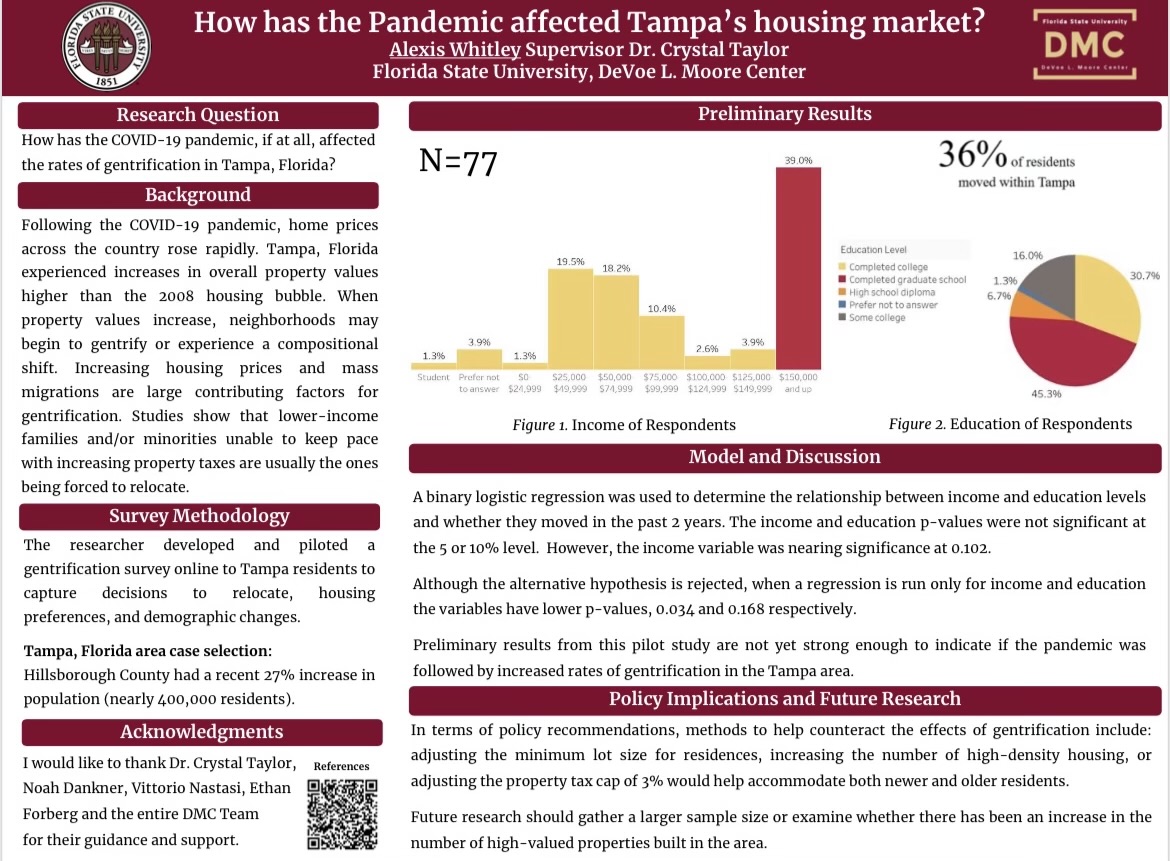Research Symposium
23rd annual Undergraduate Research Symposium, April 6, 2023
Alexis Whitley Poster Session 1: 11:00 am - 12:00 pm/ Poster #38
BIO
Alexis Whitley, also known as Lexi to those that know her well, is a senior at Florida State University. She is a double major in Political Science and Economics with a minor in Spanish. This is her second semester as a DeVoe L. Moore Center intern and she currently works as a Public Policy Intern. One of the main things that Lexi is currently researching is how COVID-19 has affected the rates of gentrification in the greater Tampa community and surrounding areas. One of the main reasons as to why Lexi is interested in this field is due to the fact that she is from the area and has been able to witness the many different aspects of the changes in the community at large. Outside of the DeVoe L. Moore Center and the work that she is passionate about there, she is the Vice President of the fencing club at Florida State. She is also a member of fraternity and sorority life on campus as a member of the chapter of Alpha Gamma Delta and has previously participated on their Line Dance team. Some of her hobbies include surfing, reading, pilates, and traveling.
How has the Pandemic affected Tampa’s housing market?
Authors: Alexis Whitley, Dr. Crystal TaylorStudent Major: Economics and Political Science
Mentor: Dr. Crystal Taylor
Mentor's Department: Devoe L. Moore Center Mentor's College: College of Social Sciences and Public Policy Co-Presenters:
Abstract
ollowing the COVID-19 pandemic, home prices across the country skyrocketed. Tampa, Florida experienced increases in overall property values higher than that of the 2008 housing bubble. When property values increase, neighborhoods may begin to gentrify or experience a compositional shift. Although the term “gentrification” itself does not have a negative connotation, lower-income families and or minorities are usually the ones being forced to relocate as a result, being unable to keep pace with increasing property taxes. This research uses survey methodology to explore what extent of gentrification, if any, exists in the Tampa Bay area following the pandemic. Drawing from a sample of Tampa residents, the survey asks respondents questions about housing preferences and recent relocations within the last three years. A logistic regression was employed to determine the correlation between high-education and -income individuals moving into the area. Preliminary results are not strong enough to indicate that the pandemic was followed by increased rates of gentrification in Tampa. In terms of policy recommendations, adjusting the minimum lot size for residences, increasing the number of high-density housing, or adjusting the property tax cap of 3% would help accommodate both newer and older residents. Future research should examine whether or not there has been an increase in the number of high-valued properties built in the area.
Keywords: COVID-19, Gentrification


